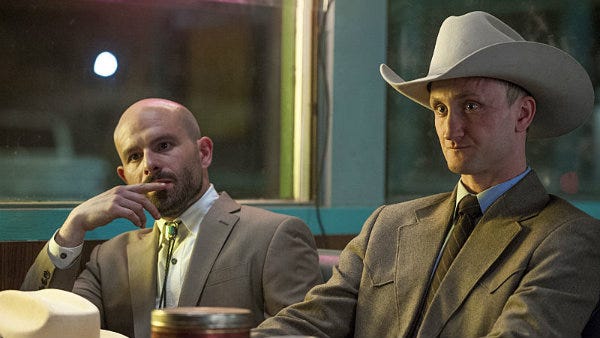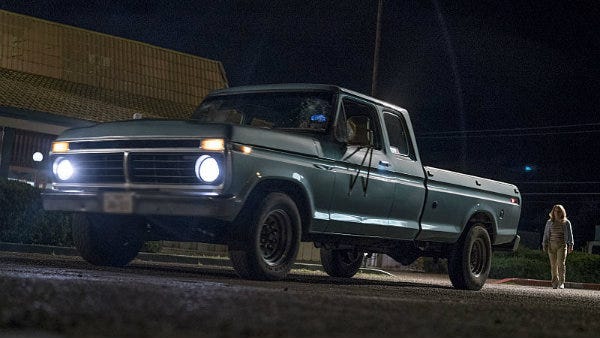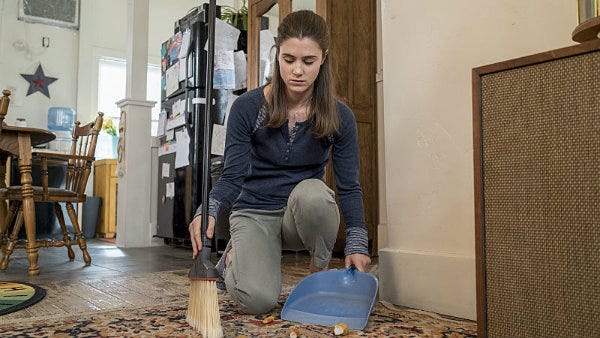Join or Sign In
Sign in to customize your TV listings
By joining TV Guide, you agree to our Terms of Use and acknowledge the data practices in our Privacy Policy.
Preacher: We Have To Talk About That Motel Fight
Why the series just keeps getting better
Sometimes when I'm writing about episodes of TV, it's all about analyzing complex plot points or making connections between embedded themes. Other times, episodes like Preacher's "Sundowner" come along and all I want to do is type in all capital letters about how EXTREMELY COOL particular sequences are. As I predicted after last week's strong, stabilizing effort, "Sundowner" saw Preacher turn the corner toward the back part of its first season with supreme gusto.
Major questions were answered, and one significant character seemingly left the mortal plane of existence, but the true highlight--and maybe the singular highlight of the first six episodes--was a glorious opening fight featuring Jesse (Dominic Cooper), DeBlanc (Anatol Yusef), Fiore (Tom Brooke), and, eventually Cassidy (Joseph Gilgun), on one side and a determined, inexpressive representative from heaven on the other. Once DeBlanc and Fiore laid the truth on to Jesse--the 'thing' inside of him is called Genesis and is the result of some forbidden angel/demon sex--the squabbling trio couldn't escape the unnamed figure from above, who was on her own mission to bring DeBlanc and Fiore back upstairs.
Spiraling out from the local diner parking lot and back to their motel room, DeBlanc and Fiore exasperatedly had to further explain about Genesis, the politics of heaven, and the rules of "articulation" and "disarticulation"--or how they and their less-friendly female counterpart can repeatedly die and return, in a completely refreshed body, with seemingly no consequence. The one wrinkle to this immortality? Slow, methodical disarticulation. Unfortunately for Jesse and his two new frenemies, disarticulation isn't particularly easy, which resulted in a surprisingly extended showdown in the motel room, where DeBlanc, Fiore, and the competition just kept dying. Over and over. With countless 'copies' of their bodies crumpled into a bloody heap on the floor. And then Cassidy made it worse.

This sequence encapsulates exactly what Preacher wants to be: violent, playful, artfully directed, and a little bit silly. The direction by Guillermo Navarro, frequent collaborator of Guillermo del Toro and Oscar winner for his work on Pan's Labyrinth, brought all those elements together, creating a constant flow of great moments that eventually didn't even visually show the carnage in the motel room. Instead, much of it played out just off-screen, with Jesse and company failing and tripping numerous times as we watched through a small hole in the wall of the next room. It's the kind of direction that most shows can only dream of, and an expert handling of different tones that only shows like Breaking Bad, Better Call Saul, and maybe Fargo have recently nailed from a directorial perspective.
Put another way: In a show like Fargo, extended, genre-bending sequences like this can sometimes morph from "oh, that's really great" to "OK, yes, we get it, you're showing off." But here, as the camera pulled further away from the action and Cassidy entered the fray, Preacher just kept getting better. The sequence did everything right--from coming directly back to the action after an already fun hard cut into the opening credits, to Fiore and DeBlanc's growing frustration with Jesse's desire to not only keep Genesis but continue to use it.
Plus, the entire deal still enabled the show to continue its trend of only sort of explaining things that are definitely essential to the ongoing story. While Fiore and DeBlanc indeed unveiled some key details about Genesis, the never-ending war between heaven and hell, and the dark turn that could come with Jesse using his newfound abilities on the regular, they also never really tried--or had much of a chance--to get too deep into specifics. The self-proclaimed "custodians" of Genesis repeatedly answered with some form of "I don't know" when pressed for additional details, and at least once noted that the rearticulation process works "just happens."

Those responses may frustrate some viewers who are looking for concrete details about a very weird storyworld. But for me, the knowing disinterest in "answers," or explaining much of anything beyond what's necessary to move the story forward, is one of Preacher's greatest strengths just six episodes into its run.
Somehow, Preacher also managed to make another good 30 minutes of TV after that whirlwind opening sequence. Everyone we know survived the bloodbath, just in time for Jesse to give Fiore and DeBlanc one last kiss-off: he's not giving Genesis back, and if God has a problem with that, then he/she/it can come and take it from him. Yet again, Jesse doubled down on his self-confidence about the path for Genesis and the people of Annville, and yet again the show demonstrated that he's probably very wrong about what 'good' these abilities are actually going to bring anyone.
This week's victim was poor, sweet, confused Eugene, aka Arseface (Ian Colletti). After Jesse set him up with some forced forgiveness from Tracy's mother in the previous episode, Eugene suddenly had friends, or at least associates, at school. One more time, the show used the perceived horror around Eugene to build suspense, only to pull the rug out from underneath the audience. Here, it was Eugene being led to a dark tunnel by a pack of fellow teen boys--surely as part of some ugly bullying attempt, right? Nope! The teens just wanted to light off some dope fountain fireworks.

It was so nice and beautiful that Eugene felt even more guilty for Jesse's manipulated reunion between he and Tracy's mother. This led to Jesse and Eugene having their first real blowout, as the preacher couldn't begin to understand why Eugene would want to return to his old life, with everyone treating him like a cancerous outcast. Well, Jesse at least pretended to understand. But he knew why--Eugene was right, just like DeBlanc and Fiore were right. Genesis isn't a simple solution for Jesse, the town of Annville, or humanity at large. Unfortunately, that didn't stop Jesse, in a moment of frustration and weakness, from using his abilities one more time and telling Eugue to "go to hell." And he did, literally? Figuratively? Probably both.
With that high-quality final moment, Preacher capped off its most enjoyable episode since the pilot. The first 10 minutes were tremendous and the last five, though not nearly as viscerally exciting, offered a wonderfully contrasting bookend. You know the story: it's all fun and games until you angrily send someone to hell with your otherworldly mind control abilities.